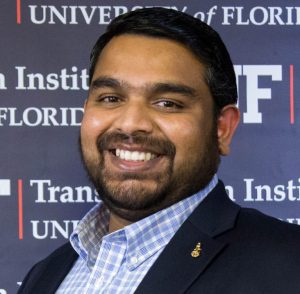Dr. Nithin Agarwal joined the UFTI in 2017. His expertise in traffic operations, highway safety, and evaluation of emerging technologies was a perfect fit with UFTI’s projects. He became manager of the Transportation Safety Center, which delivers advanced safety analysis and recommendations to under-resourced communities and counties. In 2019, he became director of the UFTI-T2 Center and added a new chapter to its 40-year history of technology transfer with an emphasis on research to practice and broadened programs in training program and technical assistance.

Dr. Agarwal grew up in India, and he was attracted to transportation from an early age, especially large-scale systems like Eurail and the U.S. Interstate Highway System. He admits to a fascination with speed such as Formula One racing and fighter jets. This allowed him to explore other areas of transportation. Dr. Agarwal pursued a Bachelor in Transportation Engineering in India and then earned his Master’s and PhD in the U.S., focusing on transportation engineering. During his academic journey, he had the opportunity to work on diverse research projects in railroads, airports, traffic operations, and highway safety. When he joined UFTI, he added emerging technologies to his portfolio. Dr. Agarwal says that at every step, there were transportation-related opportunities presented and a great support team that augmented his involvement and contribution in the transportation industry.
For many of Dr. Agarwal’s projects, a keyword is safety. With the Transportation Safety Center, he works to implement Highway Safety Manual principles to identify safety projects that would qualify for Highway Safety Improvement Program funds. Working with Safe Routes to School, he is developing a framework that agencies can use to identify and prioritize schools for safety improvements. For connected and autonomous vehicles, he assists a safety research team at UFTI to leverage connected vehicles to enhance cooperative driving in order to improve safety. He also works to evaluate emerging technologies such as automated trucks and advanced driver assistance system to quantify their safety performance and develop guidance for end users.
Through the UFTI-T2 Center, Dr. Agarwal focuses on workforce development. This involves maintaining an active training program that meets the needs of entry-level personnel and experienced professionals. For the latter, he keeps a close eye on the profession and the practice of transportation to select “hot topics” that can be developed as courses or custom training and delivered through the T2 Center. Dr. Agarwal has significant experience in traffic operations, especially signal timing, and he has assisted researchers in the computer science department in developing an algorithm to utilize machine learning to identify signal timing deficiencies.
The Southeastern Transportation Research, Innovation, Development and Education Center (STRIDE) is a University Transportation Center (UTC), a consortium of 11 southeastern universities, led by the UFTI. Dr. Agarwal is leading a project for STRIDE to develop a practical curriculum to prepare transportation students and professionals for cross-agency and interdisciplinary approaches to congestion management, specifically by learning and improving skills related to traffic signal systems to reduce congestion in the Southeast U.S.
The project will result in a prototype curriculum synthesized from courses being offered by agencies and higher education entities throughout the Southeast. The curriculum will be delivered through a symposium that will bring together professionals and students to acquire new knowledge and skills in traffic signal technologies to mitigate congestion and foster an efficient and safe transportation network. The synthesis curriculum and symposium will establish a dialogue between transportation professional and academic groups to further enhance workforce development in transportation fields.
The symposium is intended to become an annual event with ongoing development of the curriculum. This will lay the foundation for a new and continuously adapting practice among transportation engineers across the Southeast region, resulting in a consistent and effective response to congestion.
Through these efforts and others, Dr. Agarwal continues to seek new opportunities to apply his expertise and to engage the Transportation Safety Center and the UFTI-T2 Center to improve transportation safety and efficiency and raise transportation’s state of practice in the Southeast and beyond.